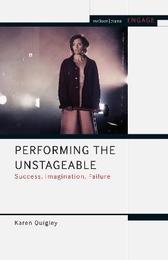
|
Performing the Unstageable: Success, Imagination, Failure
Hardback
Main Details
| Title |
Performing the Unstageable: Success, Imagination, Failure
|
| Authors and Contributors |
By (author) Karen Quigley
|
| Series | Methuen Drama Engage |
|---|
| Physical Properties |
| Format:Hardback | | Pages:272 | | Dimensions(mm): Height 216,Width 138 |
|
| Category/Genre | Drama
Literary theory |
|---|
| ISBN/Barcode |
9781350055452
|
| Classifications | Dewey:792.025 |
|---|
| Audience | | Tertiary Education (US: College) | |
|---|
| Illustrations |
4 bw illus
|
|
Publishing Details |
| Publisher |
Bloomsbury Publishing PLC
|
| Imprint |
Methuen Drama
|
| Publication Date |
20 February 2020 |
| Publication Country |
United Kingdom
|
Description
From the gouging out of eyes in Shakespeare's King Lear or Sarah Kane's Cleansed, to the adaptation of Philip Pullman's His Dark Materials trilogy, theatre has long been intrigued by the staging of challenging plays and impossible texts, images or ideas. Performing the Unstageable: Success, Imagination, Failure examines this phenomenon of what the theatre cannot do or has not been able to do at various points in its history. The book explores four principal areas to which unstageability most frequently pertains: stage directions, adaptations, violence and ghosts. Karen Quigley incorporates a wide range of case studies of both historical and contemporary theatrical productions including the Wooster Group's exploration of Hamlet via the structural frame of John Gielgud's 1964 filmed production, Elevator Repair Service's eight-hour staging of Fitzgerald's The Great Gatsby and a selection of impossible stage directions drawn from works by such playwrights as Eugene O'Neill, Philip Glass, Caryl Churchill, Sarah Kane and Alistair McDowall. Placing theatre history and performance analysis in such a context, Performing the Unstageable values what is not possible, and investigates the tricky underside of theatre's most fundamental function to bring things to the place of showing: the stage.
Author Biography
Karen Quigley is Lecturer in theatre at the University of York, UK.
ReviewsTakes us into the rehearsals rooms and across the centuries with an impressive array of references to a collection of well known and forgotten texts along the way. * The Irish Times *
|